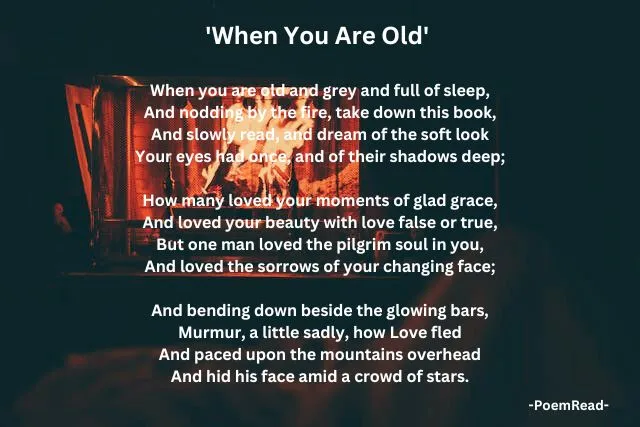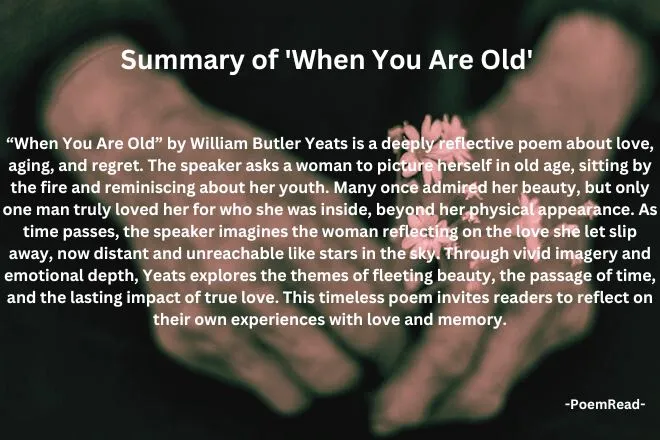
“When You Are Old” by William Butler Yeats is a touching, reflective poem that explores themes of love, aging, and regret. It invites readers to imagine themselves in their twilight years, reflecting on past loves and the fleeting nature of beauty. The poem’s gentle tone and heartfelt message create a lasting impact, drawing readers in. Its timeless themes continue to captivate audiences across generations.
'When You Are Old'
When you are old and grey and full of sleep,
And nodding by the fire, take down this book,
And slowly read, and dream of the soft look
Your eyes had once, and of their shadows deep;
How many loved your moments of glad grace,
And loved your beauty with love false or true,
But one man loved the pilgrim soul in you,
And loved the sorrows of your changing face;
And bending down beside the glowing bars,
Murmur, a little sadly, how Love fled
And paced upon the mountains overhead
And hid his face amid a crowd of stars.
Content
- About the Author
- Subject of 'When You Are Old'
- Context of 'When You Are Old'
- Theme and Tone of 'When You Are Old'
- Persona, Setting, and Narrative of 'When You Are Old'
- Structure and Form of 'When You Are Old'
- Line-by-Line Analysis of 'When You Are Old'
- Poetic and Literary Devices Used in 'When You Are Old'
- Implications and Meanings of 'When You Are Old'
- Summary
About the Author
William Butler Yeats, an Irish poet and one of the foremost figures of 20th-century literature, was born on June 13, 1865, in Dublin. Yeats was a driving force behind the Irish Literary Revival and co-founded the Abbey Theatre. His work often reflected his deep interest in mysticism, spirituality, and Irish folklore.
He won the Nobel Prize in Literature in 1923 and is remembered for his profound impact on modern poetry. Yeats’s poetry evolved from romantic to more modernist styles, and he skillfully blended personal emotion with broader political and philosophical themes.
Subject of ‘When You Are Old’
“When You Are Old” addresses the inevitability of aging and the passage of time. Yeats speaks directly to a woman, likely his muse Maud Gonne, asking her to imagine herself in old age. He urges her to reflect on her youth and the many admirers who once adored her beauty. However, the poem emphasizes that only one man truly loved her for her soul and inner self. This profound love stood apart from the superficial adoration of others.
Yeats wants her to recognize the depth of this genuine love as she grows older. The poem invites readers to consider the fleeting nature of physical beauty and the lasting value of true emotional connections. Through this reflection, Yeats emphasizes the lasting power of love and the significance of valuing genuine relationships. Furthermore, he encourages cherishing sincere connections over temporary attractions.
Context of ‘When You Are Old’
“When You Are Old” was written in 1891, during a period of great personal and professional growth for William Butler Yeats. At this time, Yeats was deeply involved in the Irish Literary Revival, a movement aimed at promoting Irish literature and culture. He was also influenced by his unrequited love for Maud Gonne, an actress and Irish nationalist who captured his heart. Despite his numerous proposals and declarations of love, Gonne did not reciprocate his feelings, which left a lasting impact on Yeats’s poetry.
This personal context is crucial to understanding the poem. Yeats uses his unfulfilled love for Gonne as a lens to explore broader themes of love and aging. The poem reflects his longing and the sorrow of a love that could never be realized. It’s a sincere reflection on how true love surpasses physical beauty and lasts through time, even as we grow old and our appearances change.
Theme and Tone of ‘When You Are Old’
“When You Are Old” centers on love, aging, and regret. Yeats talks about how physical beauty fades over time, while true love endures. He contrasts the fleeting admiration of outward beauty with the deep, lasting affection for one’s inner self. Yeats also suggests that genuine love appreciates the soul and remains constant, even as appearances change with age.
The tone of the poem is reflective and melancholic, filled with a sense of longing and wistfulness. Yeats’s words and imagery create a gentle sadness as the speaker looks back on what is lost and what lasts. This tone invites readers to reflect on their own experiences with love and time, creating an intimate and emotional connection. Through this reflective tone, Yeats communicates the bittersweet nature of memory and the powerful impact of true, heartfelt love.
Persona, Setting, and Narrative of ‘When You Are Old’
Persona
In “When You Are Old,” the speaker adopts a reflective and contemplative persona. The voice is intimate and personal, addressing the reader directly, which creates a strong emotional connection. This persona is likely an older version of the poet himself or someone who deeply understands the inevitability of aging and the nature of true love. The speaker’s tone is tender and wistful, suggesting a deep, unfulfilled love. This reflective tone adds a layer of emotion to the poem, urging the beloved to recognize the depth of true love that goes beyond physical appearance.
Setting
The setting of the poem is imagined and symbolic, painting a picture of an elderly person sitting by a fire, nodding off to sleep. This cozy, domestic scene evokes a sense of warmth and nostalgia. The fire represents both the comfort of the present and the remnants of past passions. The setting is not confined to a specific location but serves as a backdrop for introspection and memory. It’s a place where the beloved can reflect on her youth and the passage of time. The intimate setting enhances the poem’s reflective mood, inviting readers to visualize themselves in a similar situation of quiet contemplation.
Narrative
The narrative of “When You Are Old” unfolds as a direct address to the beloved, guiding her through a journey of reflection. The poem begins with an imagined future, asking the beloved to picture herself as old and grey, full of sleep. The speaker then urges her to take down a book and slowly read, dreaming of her youthful beauty and the deep shadows in her eyes. This narrative device of projecting into the future creates a poignant contrast between the present and the past.
As the poem progresses, the speaker reminds the beloved of the many who loved her moments of grace and beauty but emphasizes that only one man loved her inner self—her “pilgrim soul.” This narrative shift highlights the distinction between superficial admiration and true, enduring love. The final stanza brings the narrative to a close with a reflective tone, as the speaker imagines the beloved murmuring sadly about how love fled and hid its face among the stars. This imagery suggests that true love, while powerful and eternal, often remains distant and elusive.
Structure and Form of ‘When You Are Old’

“When You Are Old” is composed of three quatrains, each containing four lines. The poem follows an ABBA rhyme scheme, which gives it a harmonious and rhythmic quality. This consistent rhyme pattern enhances the reflective and contemplative mood of the poem.
Yeats employs iambic pentameter, where each line typically has ten syllables with a pattern of unstressed and stressed syllables. This meter gives the poem a steady, flowing rhythm, which mirrors the gentle, introspective tone.
The poem features a mix of enjambment and end-stopped lines. Enjambment occurs when a sentence or phrase extends beyond the end of a line, creating a natural flow and continuity between lines. This technique emphasizes certain emotions and ideas, such as the fleeting nature of beauty and the enduring quality of true love. For example:
“And slowly read, and dream of the soft look
Your eyes had once, and of their shadows deep;”
End-stopped lines, on the other hand, conclude with a punctuation mark, bringing a sense of closure and emphasis to specific thoughts. The poem uses punctuation sparingly, which allows the ideas to flow smoothly and enhances the reflective tone.
The consistent structure and careful use of rhyme, meter, and punctuation in “When You Are Old” contribute to its lyrical and contemplative nature. This form supports the poem’s themes of love and aging, guiding readers through a journey of memory and reflection.
Line-by-Line Analysis of ‘When You Are Old’
First Stanza
In this first stanza, Yeats sets a nostalgic and reflective tone, inviting the reader to imagine an elderly version of the beloved looking back on her youth. The imagery of aging, the cozy setting by the fire, and the act of reading a book all contribute to a sense of calm introspection. Through the soft and tender descriptions, Yeats emphasizes the lasting impact of true beauty and genuine love, transcending the physical and reaching into the soul.
When you are old and grey and full of sleep,
This opening line sets a contemplative tone, imagining the beloved in her old age. The words “old and grey” signify the passage of time and the inevitable aging process. The phrase “full of sleep” suggests tiredness and a peaceful, perhaps even drowsy, state of restfulness. It evokes a sense of calm and resignation, setting up a reflective mood for the poem.
And nodding by the fire, take down this book,
This line paints a cozy, intimate setting. “Nodding by the fire” conjures an image of the beloved sitting comfortably by a warm fire, possibly dozing off. Furthermore, taking down a book implies a moment of reflection and introspection. Additionally, the fire symbolizes warmth and comfort, while the book represents memory and the passage of time. Ultimately, his line invites readers to imagine themselves in this serene, nostalgic scene.
And slowly read and dream of the soft look
The pace slows down with “slowly read,” emphasizing the importance of taking time to reflect. The word “dream” adds a layer of wistfulness and longing. “The soft look” refers to the beloved’s gentle and tender expression in her youth, highlighting her past beauty and the affection she once inspired. This line encourages a sentimental journey into the past.
Your eyes had once, and of their shadows deep;
This line continues the reflection on the beloved’s youthful beauty. “Your eyes had once” suggests a longing for the past when her eyes held a special allure. “Shadows deep” hints at the emotional depth and complexity in her eyes, suggesting that they held more than just physical beauty—they revealed a profound inner world. This line captures the essence of nostalgia and the desire to remember and cherish what once was.
Second Stanza
In this second stanza, Yeats contrasts superficial love with true, everlasting affection. While many admired the beloved’s beauty, only the speaker, likely Yeats himself, loved her for her soul. Here, Yeast implies that he valued the deeper aspects of her personality beyond physical appearance. The speaker’s love is depicted as genuine and enduring, even as her beauty fades with time. Through this distinction, Yeats explores the idea of love that looks beyond appearances and embraces the whole person, including the inevitable changes that come with aging.
How many loved your moments of glad grace,
In this line, the speaker reflects on how many people once admired the beloved for her elegance and charm. The phrase “glad grace” uses alliteration, creating a smooth, musical rhythm. Furthermore, this phrase emphasizes her beauty and youthful vitality. However, “moments” implies that these qualities were fleeting, suggesting that the admiration she received was tied to temporary, external attributes. The speaker reminds her of how many adored her in her prime, focusing on her outward grace.
And loved your beauty with love, false or true,
The speaker continues by acknowledging that many people loved her beauty, though not all with genuine affection. He recognizes that some admired her only superficially—“with love false or true.” The mention of “false” love suggests that some admirers were shallow, only interested in her physical appearance. In contrast, “true” love refers to deeper, more meaningful affection, though this remains a rare quality. This line underscores the idea that not all who claimed to love her truly did so, reflecting on the fleeting nature of beauty and the sincerity of love.
But one man loved the pilgrim soul in you,
Here, the speaker sets himself apart from her other admirers. He claims that, unlike those who were captivated by her outer beauty, he loved her “pilgrim soul.” The phrase “pilgrim soul” carries deep meaning, as a pilgrim is someone on a journey, often seeking something spiritual or meaningful. The speaker might be referring to her inner restlessness, curiosity, or intellect. He loved the core of who she was, focusing on the essence of her being rather than just her physical appearance. This love goes beyond time, emphasizing a deeper connection to her soul.
And loved the sorrows of your changing face;
In this line, the speaker adds another layer to his devotion by stating that he also loved the sorrows reflected in her aging face. The phrase “changing face” suggests the inevitable passage of time and the loss of youthful beauty. Yet, the speaker’s love remains steadfast, embracing even the sadness and wear that come with age. This line emphasizes the distinction between those who loved her for her beauty and the speaker, who loved her even as she aged, appreciating the complexities of her inner self and the emotions that marked her face.
Third Stanza
In this third stanza, the tone shifts significantly from the romantic and nostalgic feelings of the first two stanzas to one filled with regret and sorrow. The speaker imagines the woman in her old age, reflecting on how she let true love slip away.
The personification of love as something that has fled and now hides among the stars highlights the sense of deep loss and missed opportunity. While the speaker’s love remains constant, it has become unreachable, leaving the woman to consider the impact of her past choices. This change in tone and imagery adds emotional weight, making the final stanza a reflection on unrequited love and the passage of time.
And bending down beside the glowing bars,
This line brings the reader back to the imagery of an old woman sitting by the fire. The phrase “bending down beside the glowing bars” evokes a scene of warmth and nostalgia but also highlights her frailty in old age. The “glowing bars” of the fire symbolize the fading remnants of her past, both in terms of her youthful days and the love she once experienced. This setting maintains the reflective mood, reminding her of the inevitable passage of time.
Murmur, a little sadly, how Love fled
Here, the speaker imagines the woman murmuring quietly to herself, filled with sadness. The “murmur” suggests a soft, regretful tone as she recalls how love, specifically the speaker’s love, slipped away. This is a key turning point in the poem, as it introduces the idea that love has been lost. “How Love fled” is personified, giving the sense that love, like a person, left her life. This love was once present but is now something she mourns as a distant memory.
And paced upon the mountains overhead
After love fled, it “paced upon the mountains overhead,” suggesting a sense of distance and unattainability. The imagery here is striking, as love is depicted as wandering far away and out of reach. This symbolizes the lost connection between the speaker and the woman, highlighting the emotional distance and the love that was never fully realized. The mountains, a recurring symbol in poetry for something vast and unapproachable, represent the divide between them. The pacing also suggests a restless and unresolved love, one that still exists but can no longer be accessed.
And hid his face amid a crowd of stars.
In this final line, Yeats uses beautiful and haunting imagery to depict love as hiding “his face amid a crowd of stars.” The stars symbolize the eternal and the unreachable, suggesting that love, though still present, has moved to a place where the woman can no longer reach it. The idea of hiding “his face” implies that love, while still visible (like the stars), is distant and unreciprocated. This imagery reinforces the sense of loss and regret, as the woman realizes that the love she once took for granted is now out of her grasp.

Poetic and Literary Devices Used in ‘When You Are Old’
Alliteration
Yeats employs alliteration to create musicality and rhythm in the poem. In the second stanza, the phrase “moments of glad grace” uses repeated “g” sounds, adding fluidity to the lines. This device draws attention to the woman’s fleeting beauty and grace, emphasizing how these moments were admired by many.
Imagery
The poem is rich in imagery, painting vivid pictures that evoke emotion. In the first stanza, phrases like “grey and full of sleep,” “nodding by the fire,” and “soft look” create a serene and intimate scene of an elderly person reflecting on her life. These images help readers visualize the quiet passage of time and the nostalgia for lost youth. The final image of “Love” fleeing to hide “amid a crowd of stars” in the last stanza is especially powerful, portraying love as something ethereal and distant, yet ever-present.
Metaphor
Yeats uses metaphor to convey deeper meanings. The “pilgrim soul” in the second stanza is a metaphor for the beloved’s inner self—her journeying spirit, intellect, or curiosity. By calling it a “pilgrim,” Yeats suggests that her soul is on a quest, constantly searching, much like a pilgrim on a spiritual journey. This metaphor emphasizes the speaker’s deep, lasting connection to the beloved’s inner nature rather than just her physical beauty.
Personification
In the last stanza, Yeats personifies “Love,” giving it human qualities by saying it “fled” and “hid his face amid a crowd of stars.” This personification transforms love into an active, living force, suggesting that even though love may disappear or retreat, it still exists somewhere far away. The stars symbolize eternity, indicating that while love may be elusive, it endures in some cosmic form.
Tone
Yeats carefully crafts the tone of the poem, which is reflective, melancholic, and wistful. This tone mirrors the speaker’s feelings of longing for a love that transcends physical beauty and the passage of time. The soft and gentle language Yeats uses, like “slowly read” and “dream of the soft look,” adds to the reflective tone of the poem. It invites readers to pause and consider the deeper meaning of love and memory, creating a contemplative mood throughout.
Enjambment
Yeats makes use of enjambment throughout the poem, allowing sentences and thoughts to flow beyond the confines of a single line. For instance, the phrase “And slowly read, and dream of the soft look / Your eyes had once, and of their shadows deep;” continues seamlessly between lines, creating a sense of continuity. This fluidity reflects the seamless way memories flow and how thoughts can carry over time.
Rhyme Scheme
The poem follows a regular ABBA rhyme scheme in all three stanzas. This creates a tight, structured form that complements the reflective mood of the poem. The consistent rhyme pattern also gives the poem a lyrical, almost musical quality, which makes it more engaging and easier to follow. The rhyme reinforces the cyclical nature of life and love, suggesting that, despite the passage of time, certain emotions and connections remain constant.
Repetition
Repetition is subtle but effective in this poem. The repetition of the word “loved” in the second stanza highlights a key distinction. Phrases like “many loved your moments of glad grace,” “loved your beauty,” and “one man loved” emphasize the contrast between superficial affection and true, deep love. This repetition strengthens the poem’s message about the difference between fleeting admiration and lasting, genuine affection. Additionally, it creates a rhythm that highlights the central theme of enduring love that goes beyond appearances.
Symbolism
Fire, in the line “nodding by the fire,” serves as a symbol of warmth, life, and perhaps passion. As the beloved sits by the fire in her old age, the fire could represent both the literal warmth of the moment and the remnants of youthful passion. Additionally, the stars in the final stanza symbolize eternity and the vast, unreachable nature of love once it has retreated, adding to the melancholic tone of the poem.
Contrasts
Yeats contrasts different kinds of love in the poem—superficial versus deep, fleeting versus enduring. While many people loved the woman for her beauty, only one person, the speaker, loved her “pilgrim soul” and even the “sorrows of her changing face.” This contrast draws attention to the depth and sincerity of the speaker’s love, which remains steadfast even as time alters her appearance.
Mood
The mood of the poem is nostalgic and somewhat sorrowful. Yeats invites the reader to reflect on the passage of time and the bittersweet nature of memory. The mood deepens as the poem progresses, shifting from a gentle reflection on youth and beauty to a more somber meditation on lost love and aging. This shift in mood enhances the emotional impact of the poem, leaving the reader with a sense of wistfulness.
Implications and Meanings of ‘When You Are Old’
William Butler Yeats’s “When You Are Old” identifies themes that transcend time, exploring love, beauty, aging, and the lasting impact of memory. The poem is layered with deeper meanings and implications, which reflect both personal and universal truths. Let’s break down the key meanings and implications that resonate through the poem:
The Passage of Time
The poem is a meditation on the inevitability of aging. The opening lines depict the beloved as an elderly woman, “grey and full of sleep,” reflecting on her past. This imagery suggests that time spares no one, and beauty fades with age. The speaker encourages the reader to think about how life changes and how moments of youth, vitality, and grace are fleeting. By imagining the beloved in her old age, Yeats illustrates how our perception of ourselves and others shifts over time. The implication here is that we must appreciate beauty and love while we can, as both are impermanent.
Superficial vs. Deep Love
Yeats contrasts superficial love with deep, genuine affection. In the second stanza, the speaker reflects on how many people loved the beloved for her “moments of glad grace” and her physical beauty. However, he makes a clear distinction between those who admired her appearance and the one person, likely himself, who loved her “pilgrim soul” and the “sorrows of her changing face.”
This suggests that while many are drawn to physical beauty, true love goes beyond surface-level attraction. The speaker values her inner qualities, implying that love based on appearance is shallow and fleeting, whereas love rooted in the soul lasts.
Regret and Reflection
The poem invites the beloved (and the reader) to reflect on life and the choices made along the way. There’s an underlying sense of regret in the speaker’s tone, as he imagines the beloved in her old age, perhaps regretting that she didn’t recognize or return his love. The line “one man loved the pilgrim soul in you” hints at a missed opportunity for a deeper connection. The implication is that the beloved may one day realize, too late, that she let true love slip away in favor of more superficial relationships. This theme of lost opportunities serves as a cautionary message about appreciating genuine love when it’s offered.
The Transience of Beauty
Beauty, as described in the poem, is temporary. The phrase “sorrows of your changing face” highlights the inevitable loss of youthful beauty as one age. Yeats underscores the diminishing nature of physical beauty by focusing on how people admired the beloved’s outward appearance, only to abandon her as it faded. The poem implies that society often places too much value on external appearances, neglecting the deeper aspects of a person’s character. This focus on the transience of beauty encourages the reader to consider what is truly valuable in life—inner beauty, the soul, and lasting love.
The Eternal Nature of True Love
While beauty fades, the poem suggests that true love endures. The speaker’s love for the beloved remains even as she grows old and her appearance changes. His affection isn’t bound by time or looks; instead, it’s tied to her “pilgrim soul.” This implies that real love, the kind that sees beyond physical attributes, is eternal. In this way, the poem presents love as something that transcends the physical world, outlasting the effects of time and aging. This idea aligns with Yeats’s broader themes of spirituality and the eternal in much of his work.
The Role of Memory
Memory plays a crucial role in the poem. The speaker asks the beloved to “take down this book” and remember her past. The act of remembering, particularly in old age, is bittersweet. The beloved is encouraged to recall her former beauty, the love she received, and the one true love she may have overlooked. This reflection on the past is not just about nostalgia but also about the emotional weight of missed chances. The poem implies that, as we age, memory becomes both a comfort and a source of regret, reminding us of the choices we made and the love we either embraced or ignored.
Love and Loss
There is an implicit sense of loss permeating throughout the poem. The speaker seems to mourn the fact that his love was unreciprocated or unrecognized. In the last stanza, the image of Love fleeing “and hid his face amid a crowd of stars” suggests that love, once lost, becomes distant and unreachable. The stars symbolize something vast and eternal, yet distant—much like love that has gone unfulfilled. This implication of lost love adds to the melancholic tone of the poem, highlighting the idea that love, when not nurtured or recognized, can slip away into the past, leaving only memories behind.
Mortality
The theme of mortality looms over the entire poem. From the first image of the beloved as “old and grey” to the final vision of Love hiding among the stars, Yeats addresses the inevitability of death. The poem suggests that while beauty and even love may fade with time, the soul and the memories of love last beyond our physical existence. This ties into Yeats’s broader philosophical explorations of life, death, and what lies beyond. The implication here is that while we all grow old and die, the love we experience and the connections we make transcend our mortal lives.
Summary

“When You Are Old” by William Butler Yeats is a reflective and nostalgic poem that explores themes of love, aging, and memory. In this piece, the speaker invites the reader, likely an older version of his former lover, to remember her youthful beauty and the many admirers who once appreciated it.
As she looks back on her life, the speaker encourages her to contemplate the nature of true love and the passage of time. Through this introspection, Yeats reveals the bittersweet nature of love, emphasizing how it can be both a source of joy and regret. The poem ultimately serves as a reminder of what is genuinely valuable in relationships: a deep, enduring love that transcends physical beauty. However, he emphasizes that only one man (likely himself) loved her for her “pilgrim soul” and the deeper essence of who she truly was, beyond her physical appearance.
As the beloved grows old, the speaker imagines her reflecting by the fire, filled with memories of the past. He contrasts the fleeting, superficial love of others with his own enduring affection, which even embraced her sorrows and the changes that came with time. The poem’s tone is melancholic, suggesting both the inevitability of aging and the missed opportunities for genuine love.
Ultimately, Yeats’s poem serves as a contemplation of time, the nature of true love, and the lasting power of memory. It encourages readers to appreciate the deeper connections that survive beyond physical beauty and to recognize the value of authentic love throughout the passage of life.
If you enjoyed this analysis of “When You Are Old,” you might find our exploration of “I Am Not Yours” by Sara Teasdale equally compelling, as both poems delve into themes of longing and unfulfilled love.
RELATED POSTS
View all



